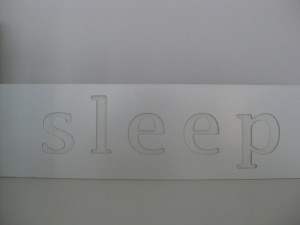We all know that 7-8 hours of quality sleep is ideal for our physical, mental and emotional health. How many of us have struggled with sleep? This is a struggle that most of us will encounter with varying degrees of frequency. Habits are a major component to our sleep along with awareness of stressors, and what we need to do to unwind at the end of the day for restful sleep. I have a flexible work schedule, so I’m not too attached to specific routines, although habits are always a priority. For sleep, I find it is very important to have routines that let your body and mind know you are preparing for rest and sleep. It could be as simple as having some herbal tea, brushing your teeth, washing your face and a little reading. Anything that helps you relax at the end of the day is helpful, since sleep is a letting go process.
Here is a sleep meditation that I have enjoyed and shared (it’s ok if you fall asleep within minutes!):
Modern life comes with electricity, plenty of ‘artificial light’ and screen time. Prior to our ability to have light on demand beyond sunset, humans needed to keep to what sunrise and sunset provided. There seems to be some variance in what times we feel best and this can be looked at with this questionnaire:
Keeping to a schedule where you feel best and rely on an alarm clock minimally will improve your sleep quality, energy level and general well being.
The general advice for good sleep is to stop screen time an hour before bedtime, sleep in a cool, quiet, dark room, have your dinner well digested and stop caffeine intake before 3pm. In Traditional Chinese Medicine, insomnia, is differentiated between inability to fall asleep, waking in the night and being unable to fall back asleep, and general unrestful sleep. Some people tend to feel hot at night, others cold. Some enjoy their dreams and others are disturbed by the types and amount of dreams they have. Some need to urinate more than once in the night. Some wake far too easily and find their sleep restless. Some sleep for 8 hours and wake up foggy and lethargic. Ideal sleep is being able to fall asleep easily and wake 7-8 hours later refreshed and full of energy. This may not happen too often for some, but there is always hope that sleep can be improved. TCM acupuncture is very helpful for improving sleep, as it helps to calm the nervous system and treat the underlying conditions that cause poor sleep quality.
All of us have different perceptions of sleep. Our society values productive work, so sleeping minimally can be a badge of honour. Some people insist they need only a minimal amount of sleep. Others like taking sleep aids sometimes to a fault, since the body becomes less sensitive to any sleep aid over time. Mother’s Little Helper, anyone? Some of us can sleep on planes and through various noises, but no snoring, please! I have observed in myself and have had many clients report their sleep is less sound around the full moon, so there is natural variance in sleep quality. Longer daylight hours in the summer months brings longer waking hours and less sleep for the season. Winter is conducive to hibernation. Anyone raised kids? That’s a phase where sleep is likely deprived!
Sleep quality is also something we perceive differently. I generally sleep well, although I work at this and have tried all sorts of sleep aids to improve sleep. This is not medical advice or endorsement of any product, just sharing of knowledge of remedies tried.
Sleep Aids:
Mother’s Little Helper is a tea available at Davids Tea. It is a blend and contains valerian, which has not worked for me in other formulations, but Mother’s Little Helper works well for me.
SleepyTime Tea by Celestial Seasonings- this is a classic formulation that has a relaxing effect perhaps tied in with the ritual of having a cup of tea, and I prefer this tea over others.
Vitamin D- I started taking vitamin D at night after dinner in March and have found it to be helpful for higher quality sleep
5 HTP- a serotonin and melatonin precursor, it helps with restful sleep
Chinese herbs- I have found various patent herbal formulations to be tremendously helpful in being able to stay asleep more soundly. The herbs work best with some professional guidance, where a TCM practitioner is able to assess your condition and constitution.
Wherever you are in relation with sleep, it is a most important health habit to prioritize, as it is the time your body regenerates itself. Quality, restful sleep makes life good!

